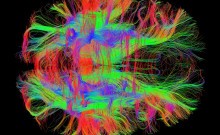The studies are not new. They were conducted in 2009. They are however among the growing evidence that emphasis the role of the immune system in mood disorders. So the question to ask is; Can depression be a simple an allergic reaction? YES, and NO.For example is is well documented that the use of anti-inflammatory oils (omega 3) has a direct effect in balancing low moods in individuals with skewed omega3/omega 6 fatty acids ratios. Also, Omega 6 oils which are high in industrial vegetable oils such as grape seed, cottonseed, safflower, corn and sunflower oils, as well as red meat are considered to be pro-inflammatory, when consumed in access. These industrial vegetable oils are also commonly used to prepare most processed foods and takeaways which might explain why depression has a higher clinical association in developed countries where such diets are prevalent.
It is also known for example that the an imbalance in the sex hormones affect mood. Skewed ratio’s of estrogen and progesterone are directly tied into the experience of PMS. Which in turn is associated with inflammatory responses during menstruation. No wonder why most woman feel better imminently after the flow.
Further more it is known that inflammation is regulated by the immune system. For example elevated cytokines is a common feature of autoimmune diseases. The immune system’s role in responding to external factors, such as food, and toxic exposure is to drive inflammation in order to eliminate the substances that cause inflammation.
It is also well documented that inflammation is common phenomenal in cancer patients, who in turn have a higher incident of depression compared to other chronic diseases.
Conversely, from a purely psychological perspective, it is also known that stress itself can drive inflammation forward. Stress responses, be they intimidate response to being chased by a bear in the wild, or chronic feelings of financial insecurity, relationship issues, anger or unresolved grief, trigger the nervous system to release cathecolamines; a group of molecules (neurotransmitters) that are associated with the fight and flight reactions. These molecules can have both pro-inflammatory as well as anti-inflammatory effects that are aimed at modulating the immune system during stress.
When it comes to auto immune disease, it is also known that there are certain psychological traits associate with recovery and recurrence. For example in Crohn’s disease a common phenomenal is an increased association of relapse in patients who tend to avoid managing the stress of their life.
So, let’s visit the question again, “Is depression be a simple allergic reaction?”
The answer is that depression is clearly associated with inflammatory responses, be they allergic in nature, dietary, hormonal, or psychological. But the causation is not linear. Which goes to restate the fundamental need for a mind-body approch in treatment of depression.
find out more about the connection between Mood Disorders and Autoimmune Reactions or Irritable Bowel Disease and Mood Disorders





Brain Peak Reviews
October 1, 2015 5:45 amHi there friends, its fantastic piece of writing regarding educationand
entirely explained, keep it up all the time.
day trading stock picks
November 14, 2015 6:56 amIt’s a pity you don’t have a donate button! I’d definitely donate to this excellent blog! I guess for now i’ll settle for book-marking and adding your RSS feed to my Google account. I look forward to new updates and will share this blog with my Facebook group. Chat soon!
Randal Heimer
November 15, 2015 9:39 pmCan I just say what a relief to uncover somebody who basically knows what theyre talking about on the internet. You absolutely know how to bring an problem to light and make it important. A lot more people today should read this and understand this side of the story. I cant think youre not additional common for the reason that you undoubtedly have the gift. jordans retro 6
cheap hats
December 29, 2015 4:32 amI’ve been exploring for a little bit for any high quality articles or blog posts in this kind of area . Exploring in Yahoo I eventually stumbled upon this web site. Reading this info So i am happy to convey that I’ve an incredibly excellent uncanny feeling I came upon exactly what I needed. I so much without a doubt will make sure to don’t put out of your mind this website and give it a glance on a constant basis.
lock pick set for cars
January 14, 2016 12:23 amYoure so cool! I dont suppose Ive read something like this before. So good to seek out somebody with some authentic ideas on this subject. realy thanks for beginning this up. this website is something that’s needed on the net, someone with somewhat originality. useful job for bringing something new to the web!
non veg wedding caterers in chennai
January 20, 2016 3:37 amI don’t even know how I ended up here, but I thought this post was great. I don’t know who you are but certainly you’re going to a famous blogger if you are not already 😉 Cheers!
wedding gifts shops in chennai
February 2, 2016 12:11 amI was recommended this website by my cousin. I’m not sure whether this post is written by him as no one else know such detailed about my difficulty. You are amazing! Thanks!
Hotels Frankfurt-Oder
February 2, 2016 6:12 amI have been checking out many of your posts and i must say pretty nice stuff. I will make sure to bookmark your blog.
Hotels Frankfurt-Oder
February 3, 2016 5:03 amI used to be suggested this web site via my cousin. I’m not sure whether or not this put up is written through him as no one else realize such specific about my problem. You’re incredible! Thanks!
temple weddings chennai
February 6, 2016 7:12 amWhen I originally commented I clicked the -Notify me when new feedback are added- checkbox and now every time a comment is added I get four emails with the identical comment. Is there any way you may take away me from that service? Thanks!
Quest Bars
February 17, 2016 4:51 amHi there would you mind sharing which blog platform you’re
working with? I’m going to start my own blog soon but I’m having a hard
time making a decision between BlogEngine/Wordpress/B2evolution and
Drupal. The reason I ask is because your design seems different then most blogs and I’m looking for something
completely unique. P.S My apologies for being
off-topic but I had to ask!
quest Bars
February 17, 2016 7:25 pmHeya i am for the first time here. I found this board and I find It really
useful & it helped me out a lot. I’m hoping to offer one thing again and aid others such as you aided
me.
quest bars
February 18, 2016 3:28 amToday, I went to the beach with my children. I found a sea shell and gave it to
my 4 year old daughter and said “You can hear the ocean if you put this to your ear.” She
placed the shell to her ear and screamed. There was a hermit crab inside and it pinched her ear.
She never wants to go back! LoL I know this is entirely off topic but I had to tell someone!
SenaidaFNova
February 19, 2016 7:37 pmThanks for ones marvelous posting! I certainly enjoyed reading it, you may be an excellent author.
I am going to make certain to bookmark your site and may even come back in the foreseeable future.
I wish to encourage anyone to definitely continue your great
posts, possess a nice holiday weekend!
my web page; SenaidaFNova
MauroKMachan
February 29, 2016 9:12 pmHighly descriptive post, I loved that bit. Will
there become a part 2?
Here is my web-site … MauroKMachan
saeid mushtagh
March 7, 2016 3:04 pmHighly descriptive post, I loved that bit. Will
there become a part 2?
Here is my web-site … MauroKMachan
saeid mushtagh
March 7, 2016 3:06 pmthanks Mauro
I am always keeping and eye for new research and will post more as soon as I see some.
thanks for sharing your website. If you are interested in linking let me know.
saeid mushtagh
March 7, 2016 3:08 pmthank you very much.
saeid mushtagh
March 7, 2016 3:09 pmI am using Creativo – Ultra Responsive MultiPurpose WP Theme
saeid mushtagh
March 7, 2016 3:18 pmHi are you still having the same problem?
saeid mushtagh
March 21, 2016 1:58 amthank you Quest,
Your experience made me think of Calcarea-Carbonica; the osyter shell.
It is a marvelous treatment for a certain type of anxiety. A type defined best an a generalized security anxiety.
Indeed there is no singular medical diagnosis for that kind of anxiety, but there always are approaches to to manage, treat even eliminate.
curiously what happened to the crab inside”?
Reyes Millien
July 7, 2017 7:55 pmAwesome information. {Can’t tell you |Can’t believe] I have never seen all of this from that angle
website laten maken
July 8, 2017 5:43 amGreat info. Lucky me I came across your blog byy acciddent (stumbleupon).
I’ve book-marked it for later!
đau bụng dưới bên phải và đau lưng
April 1, 2018 12:42 pmThis text is priceless. When can I find out more?
http://www.chuabenhdaulung.com/an-gi-de-chua-thoat-vi-dia-dem.html
April 2, 2018 5:47 amAfter looking into a few of the articles on your site,
I seriously like your way of writing a blog. I book marked it to my bookmark website list
and will be checking back in the near future. Please check out my web site too and let me know what you think.
live22
April 4, 2018 5:54 pmHello everybody, here every one is sharing these know-how, so it’s pleasant
to read this web site, and I used to go to see this blog all the time.